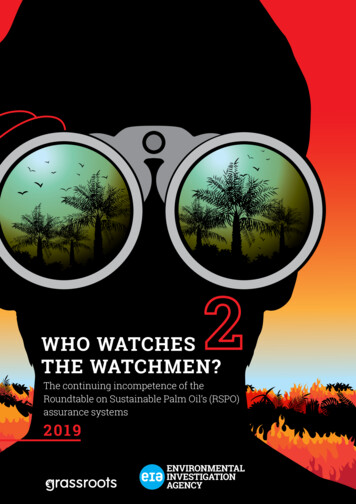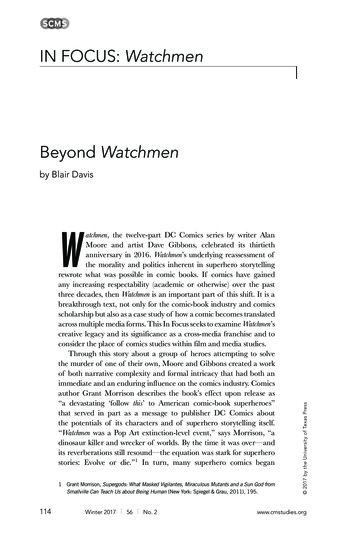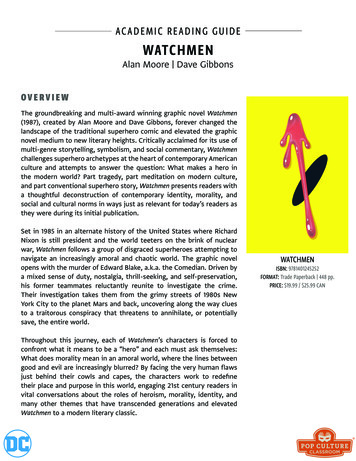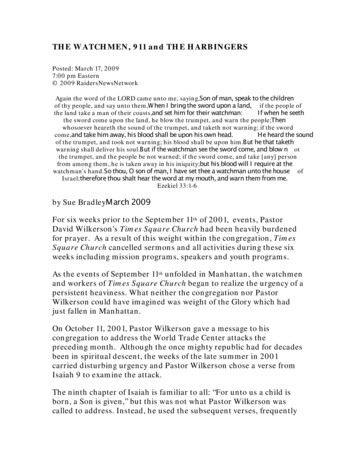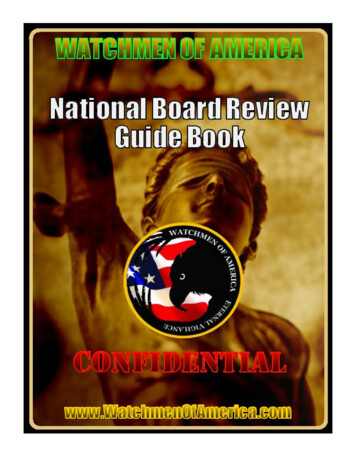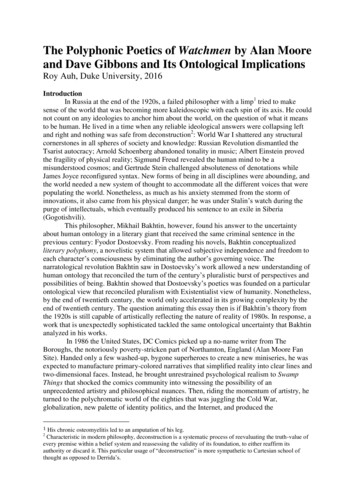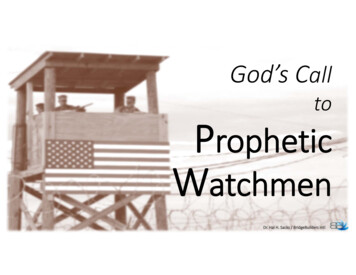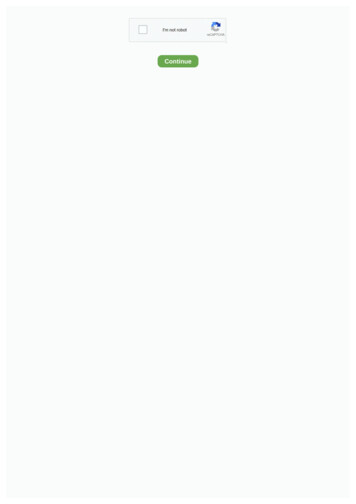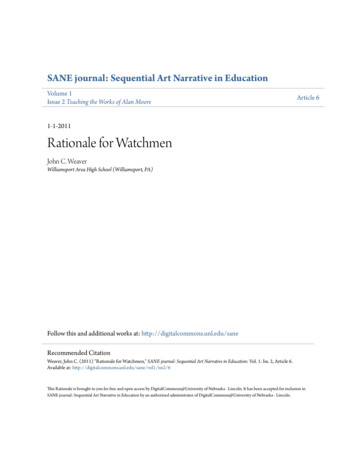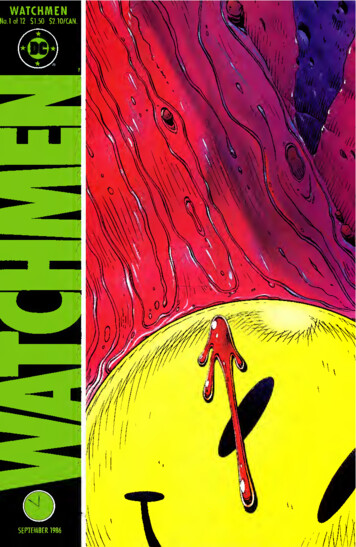
Transcription
—General Michael V. Hayden (retired)Former Director of the CIADirector of the NSAThe problem of secrecy is double edged and places key institutions and values ofour democracy into collision. On the one hand, our country operates under a broadconsensus that secrecy is antithetical to democratic rule and can encourage a varietyof political deformations. But the obvious pitfalls are not the end of the story. A longlist of abuses notwithstanding, secrecy, like openness, remains an essential prerequisiteof self-governance. Ross’s study is a welcome and timely addition to the small body ofliterature examining this important subject.—Gabriel SchoenfeldSenior Fellow, Hudson InstituteAuthor of Necessary Secrets: National Security, the Media,and the Rule of Law (W.W. Norton, May 2010).—William A. ParquetteForeign Denial and Deception CommitteeNational Intelligence CouncilGARY ROSSThe topic of unauthorized disclosures continues to receive significant attentionat the highest levels of government. In his book, Mr. Ross does an excellentjob identifying the categories of harm to the intelligence community associatedwith these disclosures. A detailed framework for addressing the issue is alsoproposed. This book is a must read for those concerned about the implicationsof unauthorized disclosures to U.S. national security.WHO WATCHES THE WATCHMEN?I see powerful echoes of what I personally experienced as Director of NSA andCIA. I only wish I had access to this fully developed intellectual framework andthe courses of action it suggests while still in government.Gary Ross has pulled together in this splendid book all the raw material neededto spark a fresh discussion between the government and the media on howto function under our unique system of government in this ever-evolvinginformation-rich environment.—Benjamin ShorePCN273891GPO Stock Number: 008-020-01606-3Library of Congress Control Number: 2011930973NI PRESSRetired newspaper journalist and editor
Who Watches the Watchmen?The Conflict Between National Securityand Freedom of the PressGary RossNational Intelligence UniversityWashington, DCJuly 2011
WHO WATCHES THE WATCHMEN?Those who surrender true liberty to a false security defend nothingworth preserving, while those who abandon real security to an illusoryliberty protect nothing worth safeguarding.- Ronald K. L. Collins,Author and Law Professoriii
LL I GENCEUNI VERS I TYT I O NA LNAINTEs ci en tia e s t l u x l u c i sGary Ross’ book, Who Watches the Watchmen?, argues thatthe tension between maintaining national security secrets andthe public’s right to know cannot be “solved,” but can be betterunderstood and more intelligently managed.Watchmen is the inaugural book in a new series titled, The NIPress Series on Denial and Deception. The series will presentoriginal research by faculty and students in the university’s Denial and DeceptionCertificate Program, as well as writings sponsored by the Office of the Director ofNational Intelligence Foreign Denial and Deception Committee.1962In August 2011, the National Defense Intelligence College was re-named theNational Intelligence University. To reflect this change, the NDIC Press wasre-named the National Intelligence Press. The goal of the NI Press is the same:to publish high quality, valuable, and timely books on topics of concern to theIntelligence Community and the U.S. government. Books published by the NIPress undergo peer review by senior officials in the U.S. government as well asoutside experts.This publication has been approved for unrestricted distribution by the Office ofSecurity Review, Department of Defense. The views expressed in this publicationare those of the author and do not necessarily reflect the official policy or position ofthe Department of Defense, the Intelligence Community, or the U.S. government.Authors of NI Press publications enjoy full academic freedom, provided they donot disclose classified information, jeopardize operations security, or misrepresentofficial U.S. policy. Such academic freedom empowers authors to offer new andsometimes controversial perspectives in the interest of furthering debate on keyissues. This publication is subject to Title 17, United States Code, Sections 101 and105. It is in the public domain and may not be copyrighted.How to order this book. Everyone may download a free electronic copy of thisbook from our website at http://www.NI-U.edu. U.S. government employees mayrequest a complimentary copy of this book by contacting us at: press@NI-U.edu.The general public may purchase a copy from the Government Printing Office(GPO) at http://bookstore.gpo.gov.Editor, NI PressCenter for Strategic Intelligence ResearchNational Intelligence UniversityDefense Intelligence AgencyBolling Air Force BaseWashington, D.C. 20340-5100ISBNGPO Sales Stock NumberLibrary of Congress Control Number978-1-932946-29-1008-020-01606-32011930973
WHO WATCHES THE WATCHMEN?TABLE OF CONTENTSCOMMENTARIES . ixFOREWORD . xxiiiACKNOWLEDGMENTS. xxviiAUTHOR’S PREFACE . xxixCHAPTER 1 – Conflicting Principles . 1Where You Stand Depends on Where You Sit . 4The Scope of Unauthorized Disclosures in the United States . 9Researching the Topic . 12Responding Through Law: The “Espionage Act” . 15Seeking an Alternative to a Legislative Solution . 18The Difficulty Identifying Leakers: A Thousand Grains of Sand . 20Statutory Abuses and Efforts to Prevent UnauthorizedDisclosures . 25Rational Choice Theory: An Alternative to a Legislative Approach . 26CHAPTER 2 – Journalist Motivations and Justifications . 29Journalist Motivations for Disclosing Classified Information . 30Altruistic Motivation – Promoting Informed Debate . 30Pentagon Papers . 31Bay of Pigs . 33Altruistic Motivation – Exposing Government Misconduct. 34i
GARY ROSSTABLE OF CONTENTS (CONTINUED)The Family Jewels . 36Colonel Alpirez . 37Non-Altruistic Motivation – Advancing Corporate Interests . 39Pentagon Papers . 41Non-Altruistic Motivation – Advancing Personal Interests. 43Veil . 45State of War . 45Collateral Murder . 46Non-Altruistic Motivation – Advancing Foreign Interests. 47Journalist Justifications for Disclosing Classified Information . 48Justification – Government Overclassification. 49Justification – Continued Toleration for Politically AdvantageousDisclosures . 52Pre-War Intelligence on Iraq . 53Stealth . 55Justification – Inadequacy of Congressional Oversight . 56Justification – Legal Protection for the Press under the FirstAmendment . 58Justification – The Ability of the Media to Handle ClassifiedInformation Responsibly . 61U-2 . 64ii
WHO WATCHES THE WATCHMEN?TABLE OF CONTENTS (CONTINUED)IVY BELLS . 65Project AZORIAN . 66Hostage Crises . 67Pentagon Papers . 67CIA Detention Facilities . 68Terrorist Surveillance Program . 68SWIFT Banking . 69U.S. Troops in Afghanistan . 70Government Employees and Their Motivations:The “Supply Side”. 71Conclusion. 77CHAPTER 3 – The Cost of Disclosing Classified Information:Identifying Harm. 79Categories of Harm. 81Damage to Sources and Methods. 82Soviet ICBM Testing . 83Operation BROADSIDE . 84Project AZORIAN . 84OBELISK . 87SWIFT Banking . 87Operation MERLIN . 88iii
GARY ROSSTABLE OF CONTENTS (CONTINUED)National Intelligence Estimate — Iran . 89Potential Loss of Life . 91Counterspy and Covert Action Bulleting . 91Mossad in Syria . 93Beirut Barracks . 94TWA Flight 847 . 95PURPLE and MAGIC . 95Disclosure of U.S. Military Field Report by WikiLeaks . 96Koran Descration . 98CIA Recruiting Iranians . 99Soviet Mechanic . 100Impact on the Development and Implementation ofForeign Policy . 100Troop Levels in Afghanistan . 101National Intelligence Estimate — Iran . 102Covert Action in Pakistan . 103Support to Egyptian Operation . 104Non-Lethal Presidential Findings . 105Effect on International Alliances . 106Net-Centric Diplomacy . 107Hadley Memo . 108iv
WHO WATCHES THE WATCHMEN?TABLE OF CONTENTS (CONTINUED)Stinger Missiles to Angola . 108Military Aircraft to Taiwan . 109Curveball . 110CIA Detention Facilities . 111Pakistani Collaboration with Afghan Insurgents . 112Financial Costs . 113Project AZORIAN . 115Project GREEK ISLAND . 115Alaskan Airfield . 116Decrease in Public Knowledge Resulting from Incomplete orInaccurate Information . 116Baghdad Diarist .
Watchmen is the inaugural book in a new series titled, The NI Press Series on Denial and Deception. The series will present original research by faculty and students in the university’s Denial and Deception Certificate Program, as well as writings sponsored by the Office of the Director of National Intelligence Foreign Denial and Deception Committee. In August 2011, the National Defense .
